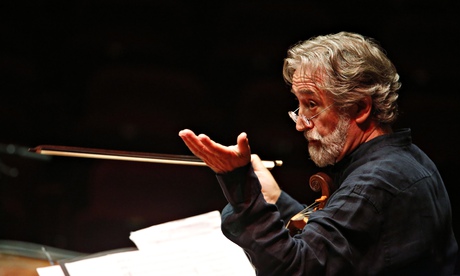
From the plains of Troy to the fields of Flanders, war is the theme of this year's Edinburgh international festival. The prompt was the centenary of August 1914. The pertinence of the array of works being performed is timeless. "To battle, to battle," urges the song of L'homme armé, the armed man of medieval Europe whose jaunty tune has inspired music through the ages, from Josquin to Karl Jenkins. "I go to war on the green heath… where the beautiful trumpets blow," runs a line in a Mahler song about a young soldier leaving his lover at the bugle's call. Kurt Weill, in a tender setting of Walt Whitman, expresses the worst truth: "The only son is dead."
Three days, six concerts and enough visions of warfare to last several lifetimes: the opening week of Edinburgh, however uplifting the music-making, offered a meditation of unblinking severity. In programmes by the Sixteen, Collegium Vocale Gent, Hespèrion XXI, Ian Bostridge and more, there was no sweet respite, no cheery interlude or fond farewell. In these early weeks of commemorating the first world war, no one would want it any other way. As the fatigue of remembering sets in, in pale mirroring of the weariness of war itself, we may feel differently. That challenge will face programme planners for the next four years, but not Edinburgh's Jonathan Mills. This year is the composer's last as EIF director. He leaves having marshalled, for 2014, some of the best concerts yet.
Whether as a spur to battle, or at the optimistic signing of a peace treaty, music has always charted the public progress of war. Jordi Savall and his group Hespèrion XXI, with three other groups – of singers, instrumentalists and traditional Turkish musicians – made a typically varied, often rumbustious programme of baroque music from 1614 to 1714. This was a tumultuous century for Europe, with barely a year of peace and the perpetual bloodshed of the Thirty Years' war and the war of Spanish Succession. Beginning with an Aramaic prayer for Passover and ending with part of Handel's anthem for the Peace of Utrecht, Savall and his musicians performed with spirit rather than finesse. Some of the choral singing from the Catalan La Capella Reial was ragged but the anonymous lament – "Weep, weep, Catalonia, for you rule yourself no more" – had a particular urgency. As much homage to Caledonia as Catalonia, this impassioned outcry reminded us of the strange recent alliance between two small nations seeking independence.
No doubt the imperfections would hardly have been noticed had not two other exceptional vocal ensembles been in town. The Sixteen and Harry Christophers gave a magnificent if slightly frustrating concert of sections from different Renaissance masses, together with Quatre motets pour un temps de pénitence by Poulenc and his Figure humaine. Works by Sheppard and Taverner showed the Sixteen on home ground, but their Poulenc, with around 30 singers, revealed a refreshing versatility and exciting richness of tone. Their final cry of "Liberté" pinged round the cavernous auditorium and, in the Usher Hall's uneven acoustic, seemed to come from behind as well as in front, which doubled the impact.
In Greyfriars Kirk, another star group, the Collegium Vocale Gent with conductor Philippe Herreweghe, sang the little-known Lagrime di San Pietro by Lassus. This cycle of 20 madrigals and a closing motet, completed in 1594 three weeks before the composer's death, is fraught with self-imposed musical restrictions and numerical symbolism. Nearly an hour long, tortured in its extremes of expression and unaccompanied, it is a supreme example of counter-reformation polyphony.
Shame, cowardice, pain and sin set the mood of penitence. The eight-line texts (by Luigi Tansillo) are similarly strict in rhyme scheme and structure, raw and vivid in language. The weeping Peter's tears, after he denied Christ, are compared to a frozen icicle in his heart, melted by the sun. Out of these constraints, Lassus spins counterpoint of gripping, seemingly artless beauty. The seven singers, notably the two sopranos, resolved every anguished dissonance into pure, radiant harmony.
At Queen's Hall, the elegant home of chamber music for the festival, Ian Bostridge and Julius Drake tackled the darker side of Mahler, Weill and Britten. Bostridge threw himself into a group of Mahler songs from 1892, responding to the brutal accounts of the soldier's life with blazing commitment and daring freedom. Occasionally this led to slightly improvisatory results, but Drake was there, the perfect co-pilot, to keep all on course. Bostridge's expressionist interpretations were a reminder that these songs are almost contemporary with Munch's The Scream.
The pair were at their finest in four jazzy wartime songs by Weill, and in four songs from Britten's Who Are These Children? (1969), settings of the Scottish poet William Soutar. Mourning the fate of children in war, with chilling contemporary echoes, they make harrowing listening: "Death came out of the sky/ In the bright afternoon." Looking drained, neither singer not pianist could do more than take their bows at the end, unable to muster more than a grim smile.
It fell to the German cellist Alban Gerhardt and the Scottish pianist Steven Osborne, who earlier in the week were two of the four who played Messiaen's Quartet for the End of Time, to bring a glimpse of levity. After a towering first half of a duo recital, in which Gerhardt, full of refinement and grit, played Britten's solo Suite No 1 while Osborne performed the gargantuan Fourth Sonata by Tippett, they came together for Beethoven's C major Sonata Op 102 and Britten's Cello Sonata. A mobile phone, obligingly ringing between movements of the Britten, invited the charming rebuke from Gerhardt, "Perfect timing". At the end he joked they would play all Beethoven's cello sonatas as an encore. Instead, they settled for a sweet sliver of Schumann.

